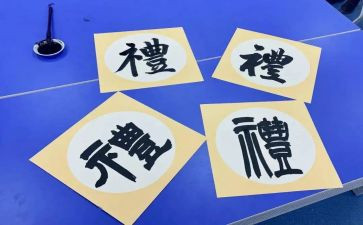中国的礼仪作文精选5篇
在写作文时,适当地使用对比和类比,可以使论证更加有力,选择积极向上的,能够让作文在情感上与读者产生共鸣,增强阅读体验,以下是400字范文网小编精心为您推荐的中国的礼仪作文精选5篇,供大家参考。

中国的礼仪作文篇1
千百年来的文明礼仪之风传承至今,因此我国素以“文明古国”、“礼仪之邦”著称于世。我国劳动人民历来重视道德修养和文明礼貌,具有悠久的传统美德。而一个素质高、有教养的文明人,心须有良好的文明礼仪。
我们身边的文明礼仪处处可见,但往往被我们所忽视。所以我们要培养良好的礼仪习惯,注重个人的仪容仪表、仪态举止、谈吐、着装等。做到着装整洁干净,勤剪指甲,勤洗手,按时理发,注意口腔卫生,不当众嚼口香糖,不随地吐啖,乱扔果皮纸屑,经常洗澡、换衣服,不当众扣鼻孔,坐姿要端正挺直、大方得体,走路要挺胸抬头,肩臂自然摆动,步速适中,表情神态要表现出对人的尊重、理解和善意,面带微笑,谈吐要态度诚恳、亲切,使用文明用语,简洁得体,体现出新世纪学生蓬勃向上的风采。
公共场所的礼仪,包括在学校、教室、影剧院等场所。要遵守公共秩序,不能大声喧哗。还有问路、购物、乘车、走路等方面,也应注意礼仪,做到谦恭礼让,尊重别人,对人恭敬,懂得礼貌,谦恭礼让能与别人友好相处,也能赢得别人的尊重、友谊和帮助,“孔融让梨”的故事大家都听说过吧!四岁的孔融把大梨让给哥哥和弟弟吃,而自己却吃小的,这正说明虽然年幼但礼仪却不短缺。
每个人来到世上,学习做人就是从讲文明礼仪开始的。现代高度文明的社会时时处处都要求人们讲文明礼貌。文明礼仪不仅给他人、给社会带来愉快和谐,也能创造充满爱心的环境,给予自己带来了快乐,带来了温馨。而且在现代社会生活中,在我们国家阔步走向世界的时候,文明礼仪已经成为国家形象的一个重要组成部分。
从小事做起,从个人开始行动。对于传承传统礼仪,我们每个人都应该从规范自身行为开始,做一个“有礼之人”。中华民族源远流长,在五千年悠久的历史长河中,不但创造了灿烂的文化,而且形成了古老民族的传统美德,在博大精深的伦理文化遗产中,很多优良的、传统的礼仪规范,直至今天仍然有很强大的生命力,它是中华民族的宝贵的精神财富。
中国的礼仪作文篇2
the dragon boat festival, also called the duanwu festival, is celebrated on the fifth day of the fifth month according to the chinese calendar. people always eat rice dumplings and watch dragon boat races to celebrate it. the festival is best known for its dragon-boat races, especially in the southern places where there are many rivers and lakes. it’s very popular. the rice dumpling is made of glutinous rice, meat and so on. you can eat different kinds of rice dumplings. they are very delicious. and dragon boat festival is for qu yuan. he is an honest minister who is said to have committed by drowning himself in a river. overall, the dragon boat festival is very interesting! the middle-autumn festival the middle-autumn festival is one of the traditional chinese festivals, it is often held in september or october. during the festival, family members get united and have moon cakes together. there are various kinds of moon cakes, such as bean paste, egg-yolk or meat. the shape of a moon cake is round as it symbolizes a big moon. moreover, in the evening of the middle-autumn festival, people get together in a vacant place, eating delicious moon cakes while appreciating the beautiful moon hanging in the dark sky. to conclude, the middle-autumn festival is a very nice festival for chinese people. last qing ming festival, i return home to worship my grandfather. qing ming festival is a folk festival. in the past, in the past, the qing ming festival was called "arbor day". but today, chinese visit their family graves to tend to any underbrush that has grown. weeds are pulled, and dirt swept away, and the family will set out offerings of food and spirit money. unlike the sacrifices at a family's home altar, the offerings at the tomb usually consist of dry, bland food.one theory is that since any number of ghosts roomed around a grave area, the less appealing food will be consumed by the ancestors, and not be plundered by strangers. with the passing of time, this celebration of life became a day to the honor past ancestors. following folk religion, the chinese believed that the spirits of deceased ancestors looked after the family. sacrifices of food and spirit money could keep them happy, and the family would prosper through good harvests and more children. chinese spring festival celebrating the end of winter and the warmth of spring. it began in the last day of the lunar year, ends in the 15th day of lunar new year, and also is the lantern festival. during the spring festival, people use red lantern and spring festival couplets decorate a house, put on all kinds of colored clothes, often visit friendsand relatives or together eat dumplings, fish, meat and other delicious food. the children are looking forward to receiving red envelope money, and together they play each other the fireworks, with happy. street with dragonand lion dance and some other carnival activities,cctv will held the grand spring festival gala. lantern festival is a china’s traditional festival. it is celebrated on the fifteenth day of the first month of the lunar year.lantern festival is one of the biggest holidays in china. several days before lantern festival, people begin to make lanterns. lanterns are made in the shape of different animals, vegetables, fruits and many, other things. while making lanterns people usually write riddles on lanterns. on the eve of lantern festival, all the lanterns are hung up.on lantern festival people go outside to have a look at the lanterns and guess the riddles on the lanterns. perhaps you call see some wonderful folk performances, dragon dance and new younger. everything is very interesting and everyone is very happy. our life is rich and varied.
中国的礼仪作文篇3
chinese traditional virtue
chinese traditional virtue is the excellent moral heritage we inherited from the ancients. we learned many moral characters, such as, thrift, honesty, affection, filial piety, loyalty, humaneness and so on through many old stories and life practice. i summarized it into three aspects: humanity, courtesy and integrity.
to begin with, chinese culture advocates humanity. this thought does not only seek for human peace but also for the harmony between human and nature and other creatures. there are many examples that show humanity in the history. the emperors, who gain people’s great supports such as tang taizong, kang xi, complied with the philosophy that “cultivate humanity, and then you could cultivate your family, administrate the country, and bring peace all over the world” (the book of rites). additionally, there goes a famous saying, “honor the aged of other people as we honor our own, take care of the young of other people as we take care of our own” (the analects). this important part of humanity makes great contributions to establishing a harmonious society. all in all, humanity makes us show respect to not only human life but also the environment and all kinds of life around us.
in addition, china, a nation which has civilization of 5,000 years, puts courtesy at a very important position. from the old to the young, from the important events to the trivial things, it is common for people to use this rule to regulate their behavior. the traditional story of kong rong sharing pears is well-known by chinese people. the behavior of kongrong to choose the smallest pear and leave the bigger ones to his brothers is a good explanation for the courtesy and comity. courtesy makes us form many good habits in the daily life, for instance, saying hello to teachers, respecting parents, showing courtliness to our friends, giving up our seat on the bus to the people who needs it more. what’s more, courtesy play an important role in the chinese diplomatic policy which do great help to the success of building steady relationship with other nations.
last but not least, chinese ethics place a great emphasis on integrity. it is the basic
principle when we get along with others. for this reason, i regard it as the most important rule we should obey to regulate our behavior. integrity is needed in every field of our life. to be honest and sincere is the fundamental thing to be a human being. just as the famous saying of socrates “the dishonest life is not worth living”. moreover, honesty and integrity is necessary when we are handling the relationship with friends and family members. keeping secrets among family and friends often harm them deliberately or in deliberately. still, in a business perspective, integrity is mainly with sincere reception, fair trade, abiding by the contract, pay the liabilities in time, and not cooking the books, etc. as a student, we show our integrity through pursuing the true academic knowledge, obeying the discipline of test, using the true and correct information to compete in all kinds of award selection.
in summary, i am deeply convinced that all these great virtues had, have and still will have tremendous effect on the field of regulating people’s behaviors. the chinese traditional virtues are not only the essence of ancient moral civilization, but also the cohesion of chinese national family. great efforts are essential for us to make in order to pursue and inherit all these invisible spiritual culture heritages.
中国的礼仪作文篇4
china has a long history and an excellent culture which is one of the most extensive and profound cultures in the world. table manner is an important part of the chinese culture. there is an old saying goes, “bread is the stall of life”. in fact, dining is not only to meet the
basicphysiological needs, but also key stepof social contact to close the relationship between people. under different period and different social backgrounds, table manners are different. there are many reasons behind the difference.
according to literature records,eating etiquette has formed a set of quite perfect system in zhou dynasty. in the qin and han dynasties,
people in the dining, receiving guests and other daily activities, all sat on ground. it is not sit cross-legged but knees to the ground and soles offeet face up. you should keep the upper body upright, sit on your heels. in formal situation, the order of sat should be followed.
中国的礼仪作文篇5
the great wall of china is called the "ten-thousand-ii great wall" in chinese.in fact, it's more than 6000 kilometres long. it winds its way from west to east, across deserts, over mountains, through valleys till at last it reaches the sea. it is one of the wonders of the world.
the great wall has a history of over twenty centuries.the first part of it was built during the spring and autumn period. during the warring states period, more walls were put up to defend the borders of the different kingdoms. it was during the qin dynasty that the kingdom of qin united the different parts into one empire. to keep the enemy out of his empire, emperor qin shi huang had all the walls joined up.thus, the great wall came into being.
the great wall is wide enough at the top for five horses or ten men to walk side by side. along the wall are watchtow-ers, where soldiers used to keep watch. fires were lit on the the towers as a warning when the enemy came.
it was very difficult to build such a wall in the ancient days without any modern machines. all the work was done by hand. thousands of men died and were buried under the wall they built. the great wall was made not only of stone and earth, but of the flesh and blood of millions of men.
today the great wall has become a place of interest not only to the chinese but to people from all over the world.many of them have come to know the famous chinese saying: "he who does not reach the great wall is not a true man."


